.jpeg)
Our History
The following timeline represents a visual history of Troy Philippines at the University of Southern California in Los Angeles. There are many historical events, activities, pictures, and stories that were contributed by Troy Philippines alumni and the USC Library archives that were not included in this timeline for brevity purposes.
This visual is part of the Troy Philippines History Timeline Project. Started in 2022, the purpose of the project is to research, document, and promote the rich history of Troy Philippines to its current members, alumni, the University of Southern California, and the wider community.
We hope you enjoy learning about the rich history of Troy Philippines.
Thank you. Maraming Salamat Po!
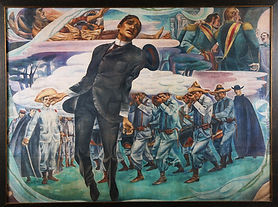
The Martyrdom of Rizal, Carlos
"Batong" V. Francisco (1973)
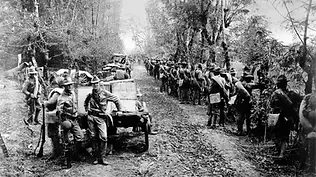
U.S. troops during the Philippine-American War (Britannica)

Royal Morales (center, back) and friends at Griffith Park
(Los Angeles Public Library)

Ferdinand E. Marcos
(Britannica)

Southern California Pilipino American Student Alliance
(SCPASA)

Program cover of the first PCN titled The First Wave
(Rex Parondo)

Troy Philippines of 1994
(El Rodeo Yearbook)

Last taken photo of Joseph Ileto with his sisters, Carmina and Raquel, and his newborn nephew, Gabriel
(Positively Filipino)

Lumpia (2003)
(IMDb)

Search to Involve Pilipino Americans
(SIPA)
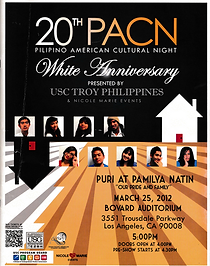
Program cover for Troy Philippines' 20th PACN
(Rex Parondo)

Members of Troy Philippines holding a relief fundraiser in wake of Hurricane Haiyan in 2013
(Arvin Dicioco)

Members of Troy Philippines performing a pattong/war dance at the first PACF held at the Caruso Center in 2015
(Daily Trojan)
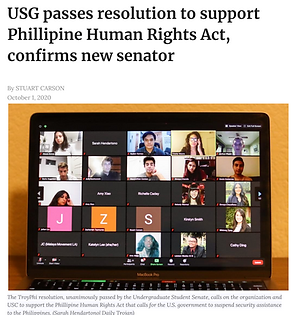
Troy Philippines meeting on Zoom with members of the USG to discuss support for the PHRA
(Daily Trojan)

Lumpia With a Vengeance (2022)
(IMDb)
1600s - 1800s
Spanish Colonization
1899
Philippine American War 1899 & American Colonization
1910-1919
Filipino Club founded at USC called “The Family”
1896
Philippine Revolution 1896 for liberation from Spain
1903
The U.S. Govt passed the Pensionado Act to pacify Filipino opposition following the Philippine-American War. Pensionado students were funded to attend American universities like USC, and return to the Philippines to work in the American colonial government. Additionally, the new migrants established Filipino communities like Little Manila/Historic Filipinotown in Los Angeles.
1940s
Filipino/Philippine Trojan Club established in the 1940’s
Benicio Catapusan first USC Pensionado student to receive PhD in Sociology
1950s
While working towards his Master of Social Work degree, Royal Morales joined Philippine Trojans Club in 1956. After graduating, Morales was known to be an active social worker, community organizer and fierce activist of human and social services issues. In 1972, he founded the nonprofit Search to Involve Pilipino Americans (SIPA) and taught at UCLA from 1983 to 1996.
1960s
The USC Philippine Circle club was established in 1964. Mostly International Students who put on “Pasko Sa Nayon” celebrations and fundraisers for scholarships.
1972
September 21, 1972 marked the beginning of the Philippine President Ferdinand Marcos’ Dictatorship with a declaration of Martial Law. Thousands were tortured, killed, and forcibly disappeared. Human rights activists around the world condemned the dictatorship and Filipino Americans lobbied the U.S. government to end their military aid and support for the Philippine government.
1975
Troy Philippines was established into USC as the official Filipino Organization
Late 1970s
Division between Troy Philippines students who wanted the club to be political and those who wanted it to be only social/cultural. Troy Philippines became only social/cultural. Troy Philippines was largely made up of International Students and was part of the International Student Association.
1979
Mission of Troy Philippines was established. “Troy Philippines unites students from the Philippines and helps promote cultural events from that country.”
1980
Troy Philippines (TP) steered away from political issues and shifted their attention on unity through friendship. TP focused on social functions like dances, banquets, picnics, and inter-club sports.
1983
In response to the increased political activism against the Marcos regime, Pilipino and Pilipino-American students from USC, CSULA, UCLA and CSUN formed the first Southern California Pilipino American Student Alliance (SCPASA). SCPASA expanded to social and cultural events.
1986
The (EDSA) People Power Revolution helped to successfully oust the Philippine Dictator Ferdinand Marcos. Following Marcos’ rigged snap election, millions of Filipinos protested around the country with the epicenter of the protests along Epifanio de los Santos Avenue (EDSA). The People Power protests resulted in the inauguration of Corazon Aquino and ended the Marcos’ dictatorship.
Troy Philippines had over 25 members and were mostly International Students.
1988
Troy Philippines had its first Pilipino Cultural Night (PCN), titled The First Wave.
1989
Troy Philippines grew to 75 students with more Filipino Americans. TP meetings moved to Thursday evenings to allow for social events on weekends.
1990
As more Filipino Americans joined Troy Philippines, TP left the International Student Association and connected with Asian Pacific American Student Services (APASS). They began to relate with other Asian American student organizations on campus.
1993
USC Troy Philippines presented their groundbreaking first Pilipino American Cultural Night (PACN) entitled Sino Ang Nakarining Ng Pangarap Mo? (Who Has Heard Your Dream?). This production shifted from typical PCN narratives to an original story developed via improv workshops.
1994
Prior to 1994, TP membership and leadership was mostly made up of Filipino males and it “felt like a boys club.” Later a strong cadre of Filipinas took over leadership and membership became more diverse.
1996
TP held Christmas Parties at the Dacumos family house for students who couldn’t go home for the holidays.
1997
Troy Phi: The Movie, directed by Patricio Ginelsa and written by Omar J. Pahati, featuring members of TP, was released. This homemade-style mystery-action film premiered at USC in Hoffman Hall’s Edison Auditorium. A comedic commercial for SARSI was made to promote the movie as well.
1998
The TP Women’s Flag Football team won the Sports Fest championship.
1999
A Filipino American postal worker named Joseph Ileto was murdered by a self-avowed white supremacist in Chatsworth. Troy Philippines joined the Asian Pacific American Legal Center, the Ileto family, and the larger Filipino community as they launched a campaign against racism and hate crimes.
Troy Philippines member Cathy Dizon was killed in a car accident along with her sorority sisters allegedly due to faulty Firestone tires. The Dizon family, members of Troy Philippines joined a nationwide lawsuit against Ford and Firestone for their negligence in failing to recall and replace faulty tires.
2001
September 11th Terrorist Attacks take place in New York City, Washington D.C. and the East Coast. Troy Philippines became a place for support and a platform to stand up against islamophobia and hate crimes. TP Members joined with USC Asian Pacific American Student Services (APASS) and Nikkei (USC’s Japanese American student organization) to hold vigils in response to the events.
2003
Lumpia was directed by TP Alumni Patricio Ginelsa. This home-movie style action comedy became a cult classic in the Filipino American community. Ginelsa graduated from USC with a BA in Cinema Production and became the Associate Producer for the award winning film The Debut (2000).
Late 2000s
TP Internship and Mentorship programs started sometime in the 2000's as the club grew in membership and formalized leadership. TP started Philanthropy and community projects with SIPA.
2012
On March 15, 2012, Troy Philippines hosted their Pilipino American Cultural Night (PACN) and their White Anniversary Celebration. PACN showcased Philippine folk dances, vocal performances, and a skit titled Puri at Pamilya Natin (Our Pride And Family) that explored the challenges of upholding Filipino traditions in America.
2013
Typhoon Haiyan (Yolanda)one of the most powerful tropical cyclones ever recorded, hit the Philippines and the Eastern Visayas killing over 6,300 people and causing untold damage. TP fundraised for disaster relief for communities hit by the storm.
2015
By 2015, TP membership was boosted to 30-50 members. This helped rebuild the club with social and cultural events and bonding.
First Pilipino American Cultural Festival (PACF) at Caruso Catholic Center.
Creation of Annual Troy Philippines Youth Conference.
2005
Hit musical group The Black Eyed Peas released “Bebot," a song that is entirely in Tagalog. The "Bebot Generation Two” music video was directed by Patricio Ginelsa and featured prominent Filipino Americans and members of Troy Philippines.
2010
Numerous Troy Philippines Eboard positions were created like Director of Programming, Public Relations, Sports Coordinator, Community and Culture Chair, Alumni Relations, etc.
2013 - 2014 School Year
No TP member ran for President from Fall to Spring. There was a lack of outreach and mentorship programs, and low Filipino student membership.
2014
TP hosted booths at the Fisher Museum’s annual Celebration of the Arts event because of the Philippines-focused exhibit, “Triumph of Philippine Art,” that was in rotation at the time. The interactive booths offered passerbyers the opportunity to make flower arrangements for the Panagbenga Flower Festival, which is an annual celebration in Baguio, Philippines. First “Boracay” Bash in 2014 (social event).
2018
Creation of the Troy Philippines Outreach Project (TPOP).
2020
Covid-19 pandemic forced Troy Philippines online. All meetings and events happened virtually.
Members of Troy Philippines grew concerned about President Rodrigo Duterte’s brutal drug war and human rights violations in the Philippines. The Duterte administration passed an Anti-Terror Act that criminalized activism in the Philippines and targeted Filipino activism abroad. TP President Richelle Caday, and student leaders Ruben Romeo, and Alexis Areias worked with USG to support the Philippine Human Rights Act (PHRA) which called on U.S. lawmakers to suspend military aid to the Philippine government.
2021
Troy Philippines established the Advocacy Chair positions to ensure that their members could support advocacy work, community campaigns, and broader social causes in Filipinx-American community.
Troy Philippines co-sponsored a 2021 Candlelight Vigil for Philippine Human Rights and successfully pressured Congresswoman Karen Bass to sign onto the Philippine Human Rights Act (PHRA).
2022
Lumpia with a Vengeance, directed by Patricio Ginelsa came out as a sequel to his first film, Lumpia (2003). The film went on to win the Audience Award for Best Narrative Feature at the Hawaii International Film Festival, despite only being a passion project worked on over the course of 7 years. TP sponsored the film showing on USC’s campus.
Friendship Games make a return as well as Advocacy Chairs reintroducing the Pilipinx Studies Campaign.
TP Leadership Program launches the TP History Timeline Project.
TP supports the Stop Asian Hate campaign after hate crime and attack against the Roque family in North Hollywood.
2023
The 31st PACN was performed, titled Our Kuwentos (Our Heritage, Our Stories).
April 2023 first GM in-person Retreat in San Diego since the beginning of the Pandemic.
Open Forum on Palestine-Israel and solidarity statement in support of Palestine Nov-Dec 2023
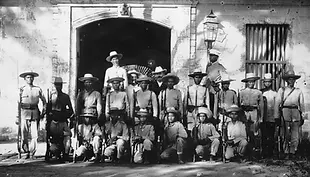
Group of Filipino revolutionaries (Britannica)
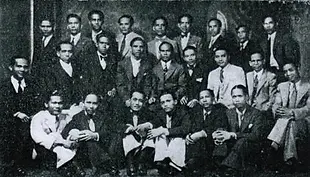
The San Esteban Circle of New York City
in 1931 (WordPress)

Filipino Trojan Club in 1940 (USC Library, Special Collections)

The Philippine Circle in 1968 (El Rodeo Yearbook)

Troy Philippines of 1979
(El Rodeo Yearbook)

Former President Corazon Aquino waving to supporters in Manila on January 27th, 1986
(NBC News)

Troy Philippines of 1989
(El Rodeo Yearbook)

Program of the first PACN titled Sino Ang Nakarinig Ng Panarap Mo? (Who Has Heard Your Dream?)
(USC Library, Special Collections)

Troy Philippines celebrating Christmas at the Dacumos Family House in 1996
(Michelle Pizarro)

Troy Philippine's Women's Flag Football team winning Sports Fest against CSUF in 1998
(Michelle Pizarro)

Lights shining from the 9/11 Memorial in
New York City, New York
(CNN)

"Bebot" by The Black Eyed Peas (2005)
(IMDb)

Troy Philippines of 2010
(El Rodeo Yearbook)

Article covering the Celebration of the Arts at the USC Fisher Museum in 2014
(Daily Trojan)
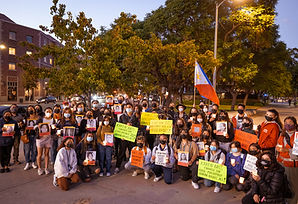
Troy Philippines, alongside family and friends, hold a candlelit vigil outside the USC Village for the victims in Duterte and for Congresswoman Karen Bass to sign the PHRA in September, 2021
(Daily Trojan)

Program cover of Troy Philippines' 31st PACN titled Our Kuwentos (Our Heritage, Our Stories)
(Alex Montances)